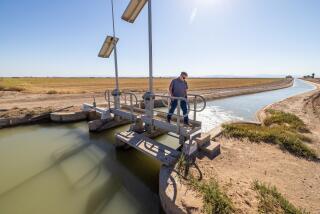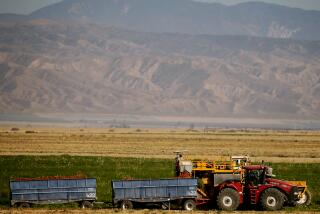Thirsty? Consider It Your Just Deserts
- Share via
None of the recent public debates over Southern California’s share of Colorado River water have mentioned the simple fact that none of us are living within the ecological limitations of where we live.
The discussion covers urban versus rural entitlements, surpluses, allotments, agreements among states and water districts, and who is privileged to consume more. We have forgotten that Southern California is essentially a desert and that we’re all using water as if it’s the tropics.
As a small farmer, I have never had that luxury. I don’t get government-subsidized water, so by necessity our farming systems have evolved in ways that do more with less. This is not just a financial issue but also my responsibility to the other people who share this desert, and to an ecosystem that is essential to all of us. And ultimately, it is also a creative and rewarding endeavor.
Each year thousands of people come through our Southern California farm to see how it is possible to feed hundreds of families with the harvest from only 12 1/2 acres.
They see efficient drip irrigation and recycled hay mulch, and they taste sweet dry-farmed tomatoes grown with the remains of the rainfall we get from November to March. They also see composting toilets that use no water, showers that also irrigate orchards and tractors that run on French fry oil.
As long as farmers grow thirsty crops like alfalfa or lettuce and city dwellers worship green lawns, tropical landscapes and carwashes, the struggle will continue to be over who gets more of a shrinking resource.
As populations increase, water resources -- whether aquifers or rivers -- will continue to decrease. Drought conditions will stress systems that are expected to yield at a far greater rate than they can replenish themselves.
Wars have been (and may still be) fought over oil; in the future they may be fought over fresh water. Rather than responding as we always seem to do by grasping and grappling for “more,” why not seek out solutions that are based on conservation and efficiency?
Farmers could continue to farm with a fraction of the water they use now by selecting crops and varieties that better fit within the desert climate, using time-honored dry-farming techniques, replacing inefficient sprinkler systems with drip irrigation and improving soils so they better absorb and retain moisture.
Urban dwellers could rethink their landscapes to eliminate irrigation, install waterless toilets, reduce shower and sink flows and recycle gray water.
Policymakers could provide incentives for conservation rather than the subsidies now available for those who use more. When Cuba lost access to Soviet-produced agricultural fertilizers and pesticides, its people faced starvation. Instead of seeking out more of the same, they applied all of their creativity and knowledge to creating an agriculture based on self-reliance and natural systems that did not require outside help. The greening of Cuba’s agriculture has become a model for the world.
I am not so naive as to believe that we will change without a crisis. If the Imperial Valley water district continues to refuse a deal, and the federal government cuts Southern California off from surplus Colorado River water, we will be forced to find another way to farm and to live.
Perhaps only then will we learn to view fresh water not as ours to use and abuse but as the sacred and precious resource that it is.
*
Michael Ableman is a farmer, educator and founder of the Center for Urban Agriculture at Fairview Gardens. He is the author of “On Good Land” (Chronicle Books, 1998).
More to Read
Sign up for Essential California
The most important California stories and recommendations in your inbox every morning.
You may occasionally receive promotional content from the Los Angeles Times.













